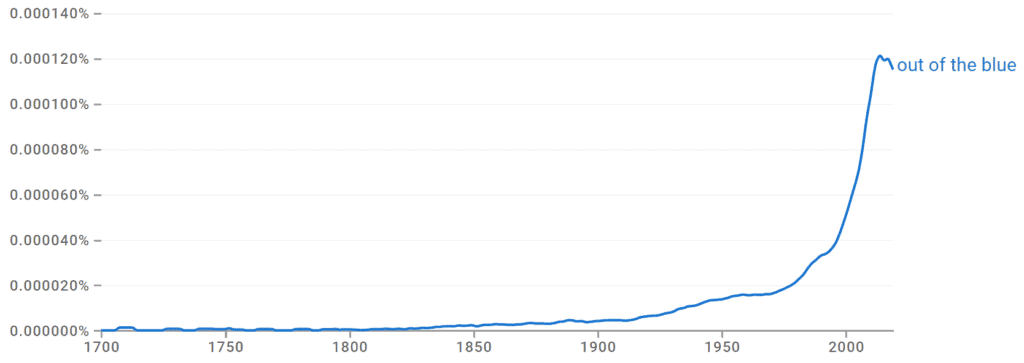There are various ways to express that something was unexpected, but the idiom out of the blue is one of the most colorful and fun to say.
Idioms are words and phrases that provide a figurative meaning to infer analogy, symbolism, or allusion in speech and writing. They offer interest and detail but can be confusing to anyone unfamiliar with their use, especially if they are looking for a literal definition.
Let’s learn about the origins of the expression out of the blue so you can use it within your own materials.
What Is the Meaning of Out of the Blue?

Out of the blue is an idiom that means something has happened suddenly or without warning. Something considered out of the blue is a complete surprise and can be used both negatively and positively.
Out of the Blue Sentence Examples
- She stood in shock at the open door while watching the car drive away, utterly shocked at how abrupt and out of the blue his departure had been.
- He glanced at the screen before turning back to the detectives exclaiming, “As I said before, the apology letter I received came out of the blue, and I truly have no connection to the person who sent it.”
- He was convinced the university had rejected his application, so it felt like his acceptance had arrived out of the blue when his mother handed it to him one day after school.
The expression is actually an abbreviated form of the longer idiom, a bolt out of the blue. Another version is a bolt out of the clear, blue sky.
Out of the Blue Origins

The expression’s original form, a bolt out of the blue, was likely in use before its first documented publication in 1837. It was initially used in reference to the unlikelihood of a bolt of lightning coming from a clear, blue sky. In this sense, the meaning was to be taken as rare or nearly impossible. Through use, it quickly took on a deeper meaning to infer that something was so completely unexpected that it was practically impossible to have occurred.
It was first used in print in the first half of the 19th century and found in the historical account The French Revolution by Thomas Carlyle:
“Arrestment, sudden really as a bolt out of the Blue, has hit strange victims.”
A variation, out of a clear sky, preceded this use by a scant few months within The Republican Compiler in June 1836:
The late veto of President Jackson on the bill to fix a day for the yearly adjournment of Congress was like a clap of thunder out of a clear sky.
The term has been in regular use for almost 200 years, seen in various newspaper articles and other publications.
For example:
- 1863, The Standard, “This is verily ‘a bolt out of the blue’—the lightning flash in a sunny sky.”
- 1875, The Dundee Courier & Argus, “A bolt out of the blue struck this afternoon. Nothing calmer than the Parliamentary sky could be imagined.”
The abbreviated form, out of the blue, was first published in 1879 and found in The Spectator:
“Twice this week, the organ of Her Majesty’s Government has fired off articles so completely “out of the blue” that it is difficult to believe they are uninspired….”
Despite its rise in popularity for the last two centuries, the phrase has started to fall out of favor in recent years.
Let’s Review
The expression out of the blue is an abbreviation of the older, longer idiom a bolt out of the blue, referring to the unlikelihood of lightning striking from a clear sky. Today, the phrase is used to express sudden surprise or to explain that something has occurred without warning.
Despite its rise in popularity over the last 200 years, the term is starting to fall out of favor—which could be due to a lack of literary exposure with the rise of social media.
Enjoyed reading about this idiom? Check out some others we covered:
